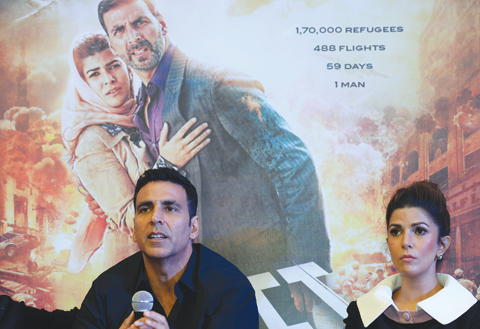Iraq's invasion of Kuwait on Aug 2, 1990 rewrote history on many levels. Iraq's occupation affected life for Kuwaitis and expats alike. Uncertainty and anxiety were rife and according to many human rights reports, Iraqi forces tortured and killed anyone suspected of opposing their regime, apart from looting homes abandoned in a hurry and generally indulging in large-scale destruction. The entire expat community in Kuwait at the time were also forced to leave with hundreds of thousands fleeing via Saudi Arabia and Jordan.
The conflict's political, economic and psychological angles have inspired many documentaries. Now a new Indian film is set to talk about something that nobody has ever broached before: The world's largest human evacuation.
World Record
Airlift is an edge-of-the-seat entertaining thriller. The story, based on a true event, is set in 1990 in Kuwait, the time of the Gulf War when Saddam Hussein invaded Kuwait. The film has actor Akshay Kumar playing Ranjit Katyal, a well-to-do Indian businessman based in Kuwait. As the Iraqi troops move in and he and his family's lives are put in danger, Katyal becomes the man who helps evacuate 170,000 Indians from Kuwait and brings them back safely to India.
Katyal and his fellow Indian refugees travel thousands of kilometers to Amman, Jordan, where they find safe passage. From Amman, the Indian government flew over 488 Air India commercial flights over a period of 59 days to bring all the Indian civilians back to India. Airlift focuses on this largest human evacuation in history, which has also found its way to the Guinness Book of World Records. In a cynical world, where one often wonders what their country has done for them, this is a stark reminder of what the country did, not for one or 10, but for 170,000 of its own.
Memory lane
For many Indians in Kuwait who survived the ordeal, this is almost like a trip down memory lane. Venkatraman*, a senior engineer who was with Kuwait's national carrier for more than 25 years recalled how the invasion was a very unfortunate incident in Kuwait's history. "When we reached office on that fateful day, we realized that the country was invaded and we couldn't leave in a hurry or do anything since the company was in possession of all our passports," he said.
Venkatraman said that they could hear missiles and random firing all over the country and while this was a period of unease, there was one saving grace: The attack occurred during the summer vacation - which meant many Kuwaiti as well as expat families were outside of the country. "We Indians were treated with a lot of respect by the Iraqi forces. During security checks on the road, one look at our civil IDs and they would say 'Hindi? Yallah, go'," he recalled.
He was one among the many Indians who went back to India via Jordan and has nothing but praise for the Indian Embassy. "Hats off to the Indian Embassy staff! They helped all the nationalities out; not only in Kuwait, but also in Jordan, and it was one time when all of us were exceedingly proud of our country."
Ransacked and Plundered
Once Kuwait was liberated and the dust settled, Venkatraman's company called each of the employees individually and asked them to rejoin work. "Our company paid us our dues and this was very welcome, since we left most of our belongings in Kuwait in a hurry." On returning to his Salmiya flat, he saw that it had been ransacked and he had to refurnish from scratch, but despite everything, he has no regrets. "We should always be grateful to Kuwait, its government and Bush Sr for liberating the country. Except for some spurious elements who tried to exploit the situation, everything ended well," he said.
Rumors abound
Christopher*, another Indian expat and investment head at a renowned local bank for 38 years, said that rumors flew around quicker than bullets - and posed more danger than ammunition. "We were warned of chemical bombs and retaliatory attacks by the occupying forces and it didn't help that we heard missiles flying all the time," he recounted. Christopher and his wife had to convince their nervous 2 year-old toddler that uncollected garbage was being set on fire - and the blasts she heard were merely exploding soda cans. "Soldiers would come knocking at doors and it was a very trying time for us with a child. We had decided that whenever we had to go out to replenish resources, all three of us would go so that if something went wrong, we'd go down together," he said.
Water Cannons
While many of their compatriots ended in refugee camps near the border and faced a hard time, Christopher and family chose to go to Amman. Amman wasn't very easy as they had to face water cannons at the embassy while trying to get a visa. The authorities saw their drenched toddler with gastroenteritis and let them in. "We saw many Indians at the airport and then knew that a mass evacuation plan was in place," he said. They flew Air India where everyone was just glad to be on the flight and heading homewards. "There were rumors that people working in certain professions wouldn't be allowed on the flight, but thankfully, these weren't true," Christopher said. The Indian government even waived all their ticket fares out of goodwill and bore the entire expense of evacuating thousands of Indians.
After Kuwait was liberated, his boss contacted him and after paying his dues, offered him his previous job, which Christopher happily accepted and returned to Kuwait. "Since many oil wells were set ablaze, the entire place looked dark and gloomy with chemicals in the air... but we were just grateful and happy to be back home."
*Names changed on request
By Priyanka Saligram











